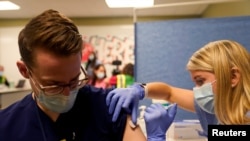The Supreme Court has left an Indiana University COVID-19 vaccine mandate in place by declining an emergency request to block the school’s requirement.
The plea to the court, filed by a group of students at the midwestern U.S. school, was rejected by Justice Amy Coney Barrett, who manages emergency petitions filed from the state of Indiana. Barrett did not appear to consult any other justices on her decision and did not provide an explanation for her ruling.
Barrett’s denial marks the first time the Supreme Court has addressed coronavirus vaccine mandates, which are being implemented at universities, companies and government organizations across the nation. Data from the Chronicle of Higher Education suggests that over 720 colleges are requiring student coronavirus vaccinations.
IU introduced the vaccine mandate in May, requiring all students, faculty and staff to be vaccinated except for those who qualified for an exemption. According to the university’s website, students can request an exemption based on religious, ethical or medical reasons.
Unvaccinated students will be required to wear masks in public areas and receive twice-weekly testing for the virus, according to the school’s coronavirus guidelines.
Eight students sued the Bloomington, Indiana-based university in June over the requirement, saying it violated their constitutional rights as described in the 14th Amendment to the U.S. Constitution.
“IU is coercing students to give up their rights to bodily integrity, autonomy, and of medical treatment choice in exchange for the discretionary benefit of matriculating at IU,” wrote a lawyer for the students in the emergency petition filed with the Supreme Court.
After a federal district judge in Indiana ruled against their case, the students faced a second rejection when the U.S. Court of Appeals for the 7th Circuit refused to issue an injunction against the vaccine mandate.
“People who do not want to be vaccinated may go elsewhere,” wrote Appeals Judge Frank Easterbrook in the circuit court’s opinion. “Many universities require vaccination against SARS-CoV-2, but many others do not. Plaintiffs have ample educational opportunities.”
Easterbrook added that university operations would benefit from coronavirus vaccinations since students wouldn’t be afraid of catching the virus from others.
Lawsuits regarding coronavirus vaccination requirements at universities in Connecticut, Massachusetts and California are currently pending in federal courts.






